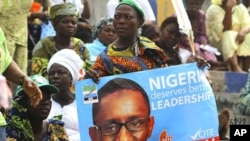A series of unsolved bombings in Nigeria's capital and continuing violence in the north make security the biggest campaign issue in the country's presidential election.
When voters are concerned about security, it is an opportunity for challengers to criticize the current government for not doing enough to keep people safe.
But after only eight months in office, President Goodluck Jonathan is campaigning as much as an outsider as he is an incumbent.
"Everybody, all over the world, is looking up to Nigeria to make significant changes, to change the country, to transform the country. And that can only be done by good leadership," Jonathan said.
The ruling-party candidate says his government has introduced a series of new anti-terrorism measures, including better control of explosive materials, inspections of police-licensed armories and the installation of closed-circuit televisions to better monitor public places.
Jonathan supporters admit he mishandled the political aftermath of an Independence Day bombing in the capital in October by too quickly absolving militants from the oil-rich Niger Delta who appeared to claim responsibility. Mr. Jonathan is from the southern Niger Delta. Northern political opponents quickly called for his resignation.
The president is responding to criticism of a Niger Delta amnesty plan that he helped negotiate by saying that the increase in oil production is evidence of greater security.
"Even the challenges in the Niger Delta, if we had not addressed them, our oil price and production would not have reached its maximum," he noted. "The production dropped to less than one-third, but now we can produce more than the OPEC quota. What caused it? And. you are saying there is no security in the Niger Delta."
Mr. Jonathan's main challenger is former military ruler Muhammadu Buhari, who says his experience in command makes him a better choice to tackle insecurity. Mr. Buhari says a lack of discipline in the ruling-party has made Nigerians usafe and is discouraging outside investment.
"The most important this is security, physical security," Buhari said. "All persons living in Nigeria must feel secure to work 24 hours a day. There is nobody who will invest his money in Nigeria when your management will be abducted and maybe you will be asked to give more than you have invested in the country to get your managers out or they get assassinated."
Former anti-corruption chief Nuhu Ribadu is also running for president. He says insecurity in both the Niger Delta and parts of the north is a product of economic frustration. Development in the oil-rich Niger Delta has never matched the wealth it generates for Nigeria. Ethnic violence in Plateau State is driven largely by land clashes between southern agriculturalists and northern pastoralists.
Ribadu says no matter how many more soldiers are deployed, there will be no end to this insecurity without resolving its economic causes.
"We all yearn for a country where our youth are empowered, where jobs and social services are made available. We can build a corruption-free society where lives and properties are protected and where peace and security is ensured," Ribadu said.
Security officials say part of the new anti-terrorism measures are stepped-up patrols at political rallies to prevent violence from disrupting the campaign for April's vote.
Nigerian Presidential Candidates Campaign on Improving Security




